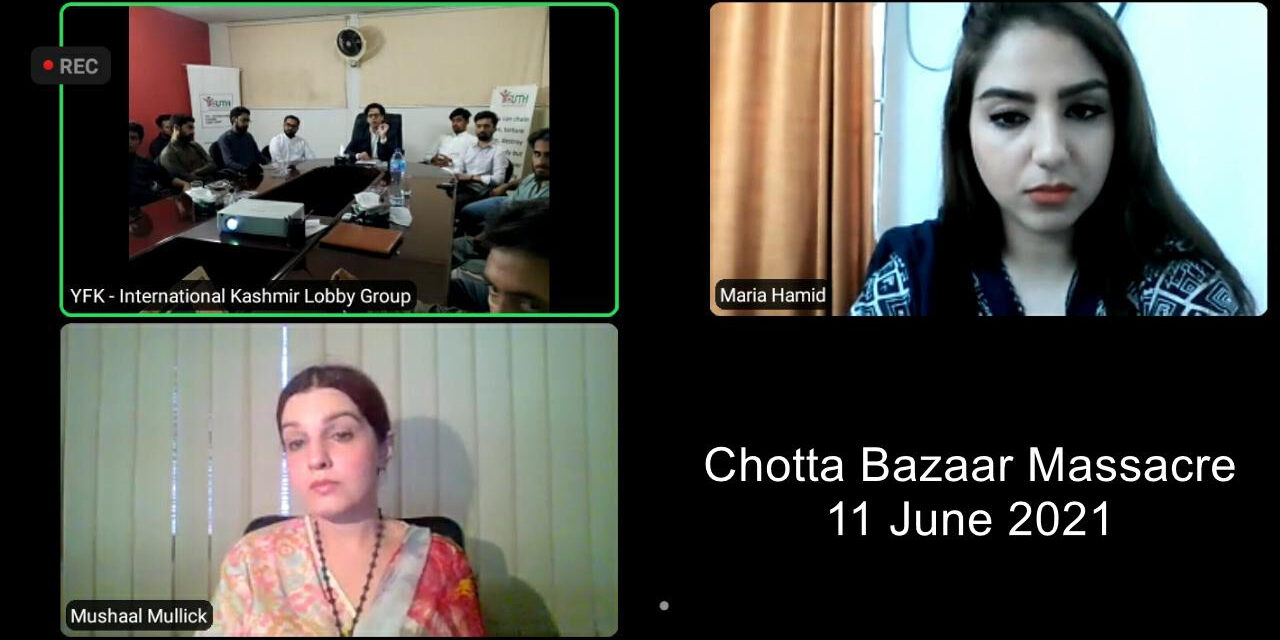30 Years Later, Activists Demand India Open Investigation Into Chota Bazar Massacre
Press Release
Friday, June 11, 2021
By News Desk
ISLAMABAD—Human rights defenders issued an appeal to the Government of India to resume investigations into a case registered under Section 302 at Karan Nagar police station in Srinagar, Indian-occupied Kashmir, on 11 June 1991, where 18 civilians were killed according to Indian police, and 32 according to local eyewitnesses.
Today we mark the 30th anniversary of this incident, on 11 June 12, 2021.
Kashmiris remember this incident as Chota Bazar Massacre, after the suburb of the city of Srinagar where events unfolded.
A transparent probe into who ordered a sudden attack on Kashmiri civilians busy in their everyday life in congested part of the city, the names of the victims, and the circumstances surrounding the incident are still pending three decades later, said a press statement by YFK-International Kashmir Lobby Group, an independent NGO working with international mechanisms for peaceful conflict resolution in Kashmir.
The demand came in a seminar organized by YFK in Islamabad, Pakistan, where Mushaal Hussain Mullick, a rights activist and the wife of jailed Kashmiri leader Yasin Malik, spoke about her experience learning about the legacy of Chota Bazar Massacre while living in Srinagar. Other speakers included Maria Hamid, a scholar on international law in conflict zones at National Defense University, Islamabad, and Ahmed Quraishi, a journalist and YFK executive director, who moderated the discussion.
The objective of the event was to ensure that the Chota Bazar incident is not forgotten, said Quraishi, who explained that India has responsibilities in Kashmir as the administering power in a disputed region, and one of those responsibilities is to protect life and property in the disputed region under its control, and ensure credible investigation into criminal cases, especially where significant loss of life has occurred.
On June 11, 1991, locals say an Indian paramilitary force company (Central Reserve Police Force-CRPF) barged out of a camp located near the Government Medical College (GMC), near the Chota Bazar locality, and opened indiscriminate fire on shops and passersby. These were the early days of the launch of an armed struggle by Kashmiri groups against Indian control after four decades of relative calm since India seized the territory in 1947. The new Kashmir awakening created a panic for Indian military forces, resulting in several violent incidents in 1990, 1991, and 1992, where it is thought they reacted with excessive force, creating incidents like Chota Bazar as a means to subjugate Kashmiris and stem further resistance.
Indian authorities are yet to release results of a probe into the incident three decades later.
The incident largely escaped international media attention in June 1991. That summer, the world was focused on the end of the Cold War, the impending collapse of Soviet Union, and the Arab-Israel Madrid peace talks.
NDU’s Maria Hamid said the Indian responsibility for an incident in a territory under its military control where many civilians inexplicablylost lives is undeniable.
“Given the articles of Geneva Conventions on rights and status of an occupying force in a region, India is bound to respect Jammu and Kashmir’s sovereignty, maintain law and order by the local administration, ensure health, hygiene, medical care, food supplies, safety, and security of the general population,” the scholar added.
Mushaal Mullick, whose husband, the renowned Kashmiri leader Yasin Malik, is jailed by Indian authorities, walked the audience through her experience in visiting the Chota Bazar locality. She explained that this is a densely populated area where an attack by security forces would Javed led to a high casualty figure, lending credence to reports that suggest up to 32 Kashmiris were killed in the incident.
Maria Hamid said that, under the jurisdiction of the law, the Indian Army is bound to respect public and private property.
YFK–International Kashmir Lobby Group (Youth Forum For Kashmir) is a non-partisan, international non-governmental organization, working for the peaceful resolution of Kashmir Conflict in accordance with United Nations Security Council (UNSC) Resolutions.
[END]
- Kashmir Martyrs day - July 24, 2024
- Heroic Hearts: Remembering Kashmir’s Martyr - July 24, 2024
- Burhan Wani: The Icon of Kashmir’s Resistance - July 11, 2024






